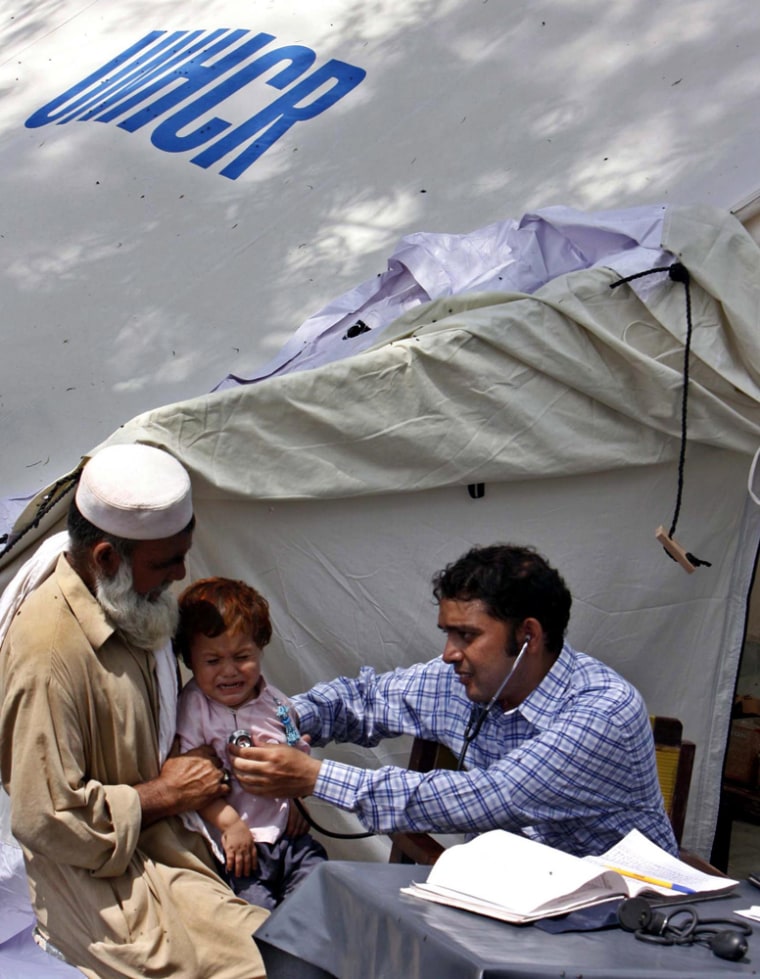The World Bank will release $900 million to help fund relief efforts for Pakistan's flood disaster as international agencies warned millions of people were at risk from disease.
The United Nations has warned that up to 3.5 million children could be in danger of contracting deadly diseases carried through contaminated water and insects in a crisis that has disrupted the lives of at least a tenth of Pakistan's 170 million people.
Up to 1,600 people have been killed and two million made homeless in Pakistan's worst floods in decades.
Hundreds of villages across Pakistan, one of the poorest countries in Asia, have been marooned, highways have been cut in half and thousands of homeless people have been forced to set up tarpaulin tents along the side of roads.
The World Bank funds will come through the reprogramming of planned projects and reallocation of undisbursed funds, but it did not say how it would be utilized to aid flood victims.
"We are reprioritizing to make the funds immediately available," said Mariam Altaf, a spokesman for the World Bank.
Public anger has grown in two weeks of floods, highlighting potential political troubles for an unpopular government as aid failed to keep pace with the rising river waters.
On Monday, some Pakistani flood victims blocked a highway to demand government help as aid agencies warned relief was too slow to arrive for millions without clean water, food and homes.
Recovery to take 'at least five years'
The damage caused by the floods and the cost of recovery could bring long-term economic pain to Pakistan and shave more than one percentage point off economic growth, analysts said.
Pakistani stocks ended down 2.9 percent on Monday on fears the impact may be more damaging than first estimated.
"It will take at least five years," Pakistan's High Commissioner to Britain, Wajid Shamsul Hasan, told Reuters. Asked about the cost of rebuilding, he said, "I think more than $10 to $15 billion."
He appealed to the international community to provide funds for relief and reconstruction for a country fighting Islamist militants, or risk potentially destabilizing the whole region.
Once the floodwaters recede, some of the hardest hit will be the millions of farmers who used the Indus River to irrigate their crops — and propel Pakistan's economy — as they face an uncertain future.
Flood fallout: food shortages
The United Nations warns that unless farmers in hard-hit Punjab and Sindh provinces manage to plant their winter crop of wheat in mid-September as normal, there might be food shortages in the region and the nation as a whole.
In the north, where the floods began nearly three weeks ago, fruit farmers are also hurting.
Last year, cherries, peaches and apricots in the Swat Valley rotted on the trees because of an army operation against Taliban militants. This year, roads and bridges have been washed away so crops cannot be carried to the rest of the country.
The disruption in food supplies is causing price increases across the country.
More than 70 percent of affected people rely on agriculture for their livelihood, according to the United Nations. Many are subsistence farmers like Abdur Razaq, who had 15 acres of land where he grazed two buffalo and two cows. The money he got from those animals was enough money to feed his wife and five children.
He said authorities told him that his land was safe from the floods but that turned out to be false: the high water came rapidly at night. He could only think of saving his family, leaving his animals to the floods.
"Only a prophet could pass a test as stern as the one we are going through now. It is beyond our capacity. It is coming from Allah," Razaq said, raising a finger skyward.
In Sukkur, hundreds of people set up camp along a sliver of dry land between the swollen Indus and a low concrete wall by a road running alongside the river.
"We left our homes with nothing and now we're here with no clothes, no food and our children are living beside the road," said Gul Hasan, who had been forced from his village and sought refuge in Sukkur.
'Where can we go?'But their sanctuary has been getting ever narrower as the river rises. On Monday, the muddy bank was just a few feet wide in some places and the water was still coming up.
"Where can we go?" asked Faiz Mohammad as he squatted on the concrete wall. "Everywhere is flooded."
The government has been under fire for its perceived inadequate response. Islamic charities, some linked to militant groups, have stepped in to provide aid to flood victims, possibly gaining supporters at the expense of the state.
Pakistan Foreign Minister Shah Mehmood Qureshi expressed concerns over Pakistan's stability, saying it was dangerous to let the Islamists fill the vacuum.
"If a person is hungry, if a person is thirsty and you provide water, he'll not ask whether you are a moderate or an extremist," Qureshi told the British Broadcasting Corporation.
"He'll grab water from you and save himself and his children who were starved. So you have to be aware of this challenge."
Aid slow to reach Pakistan
Only a quarter of the $459 million aid needed for initial relief has arrived, according to the United Nations. That contrasts with the United States giving at least $1 billion in military aid last year to its regional ally to battle militants.
The United Nations has reported the first case of cholera. In a statement issued in New York, it said the greatest threat was from acute watery diarrhea and dysentery, but that hepatitis A and E and typhoid fever were also significant risks.
Victims are relying mostly on the military, the most powerful institution in Pakistan, and foreign aid agencies for help.
Nevertheless, a military coup is considered unlikely. The army's priority is fighting Taliban insurgents, and seizing power during a disaster would make no sense, analysts said.
